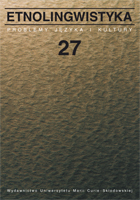Ethnography: A neglected method of inductive linguistics
Ethnography: A neglected method of inductive linguistics
Author(s): Gary B. PalmerSubject(s): Anthropology, Language and Literature Studies
Published by: Wydawnictwo Naukowe Uniwersytetu Marii Curie-Sklodowskiej
Keywords: grammar; scenarios; ethnography; cultural linguistics; linguistic frames; Tagalog; ChiShona
Summary/Abstract: Finding a productive scientific perspective on the relation between grammar and culture can be difficult, as is shown by the decades old debate on the so called “Sapir-Whorf hypothesis”. It is proposed that linguistic research should make more systematic use of ethnography as a source of meanings entrenched in grammar. The cases presented illustrate how grammatical constructions are defined by cultural schemas, scenarios, and models; how non-linguistic (co-linguistic) data resolve old problems in grammatical analysis. A potentially controversial claim is put forward that data on an archaic way of life provide clues to the nature of proto grammar. The cases examined include (1) a study of the global relations between language and culture implied by code-switching, (2) a fine-grained analysis of a semantic network that defines a compound affix, (3) the use of native language definitions to define a cultural model of sequences of thinking, feeling, and acting, (4) the use of previously published ethnographies to discover correspondences of cultural models to classes in classifier systems, and (5) the culture of a species of archaic human known to us only through archaeology and paleontology and the possible influences of this culture on the structure of proto grammar.
Journal: Etnolingwistyka. Problemy Języka I Kultury
- Issue Year: 27/2015
- Issue No: 27
- Page Range: 21-45
- Page Count: 25
- Language: English

